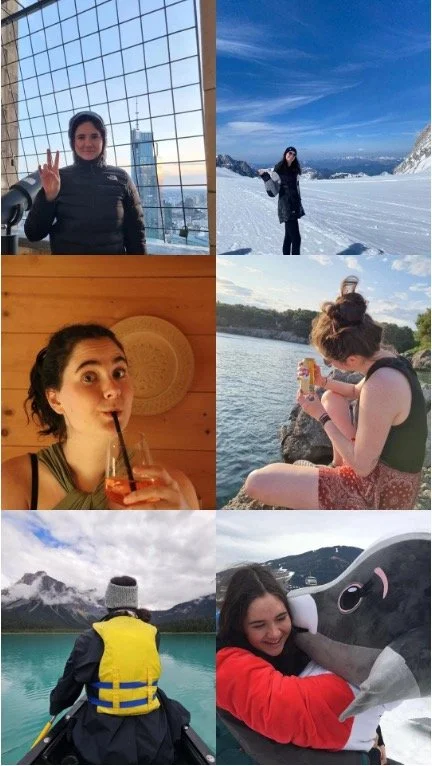People
Katarzyna (Kasia) Tych - Principal Investigator
I studied electronic engineering at the University of Leeds, United Kingdom, completing my PhD in the same department in 2011. During my PhD, I developed methods to enable the use of terahertz time-domain spectroscopy for measurements of high frequency vibrational modes in proteins. During my postdoctoral position, working with Prof. Lorna Dougan and Dr. David Brockwell, I developed a passion for single molecule protein biophysics through my studies of proteins from extremophilic organisms using atomic force microscopy (AFM). I went on to receive a prestigious cross-disciplinary fellowship from the Human Frontier Science Program (HFSP) to study the heat shock protein 90 (Hsp90) chaperone system using optical tweezers in the laboratory of Prof. Matthias Rief at the Technical University of Munich, Germany. In 2020 I obtained a Rosalind Franklin Fellowship and tenure-track assistant professorship in single molecule biochemistry at the University of Groningen. In 2021, I was awarded a Maria Sklodowska-Curie Fellowship (MSCA-IF) from the European Research Council to extend my lab’s research activities into new directions including microfluidics, membrane biophysics and electrophysiology. Since 2025, I have been promoted to Associate Professor of Single-Molecule Biophysics and Biochemistry.
I am involved in various activities at the University of Groningen including being a board member of the Women In Science and Engineering (WISE) group, being on the steering committee for the Rosalind Franklin Fellows and a board member of the Young Science and Engineering (YSEN) group.
My research involves single molecule characterisation of biological macromolecules using force spectroscopy by optical tweezers combined with fluorescence. Alongside structural work and biochemical studies, I use single molecule techniques to gain an in-depth understanding of structure-function-dynamics relationships in proteins and nucleic acids.
Beyond the lab, I'm predominantly interested in: being outside, climbing and bouldering, eating and cooking, reading and writing, playing and listening to music and travelling. All of the above in good company.
Kaori Nakao - PhD Researcher
I studied pharmaceutical science at Osaka University, Japan and got a master’s degree in the area of structural biology in 2020. My research interests involve molecular level of activities and conformational changes of enzymatic proteins. Here, I work on my PhD with single molecule optical tweezers. I’m so grateful for this opportunity.
Being outside, coffee, and books are my favourite.
Yulia Yancheva - PhD Researcher
I am from Bulgaria and I did my MPhys Physics degree in the Department of Physics and Astronomy at the University of Manchester in the UK. My degree was mainly focused on experimental physics but I also learned a lot about computational methods. During my masters project I was working on simulating molecular dynamics and small angle neutron scattering of proteins. The aim of this project was to develop a combined method to study structure and dynamics of proteins using approaches from experimental and computational biophysics, using the GROMACS and SasView softwares.
Although my Masters project was on the boundary between experimental and computational biophysics, throughout my degree I developed interest in biophotonics and in general using light to study living matter.
In my PhD project, I am working on investigating the mechanisms of enzyme diffusion, in particular enhanced enzyme diffusivity. I am using optical tweezers to characterise enzymes and to quantify the conformational changes they undergo in the presence and absence of substrate. I will also be using mass photometry to look at how the diffusion coefficient of enzymes changes when substrate is present in solution. The advantage that both methods offer for the investigation of enzyme diffusivity is that they do not require fluorescent labelling.
In my time outside the lab, I enjoy climbing and bouldering, as well as hiking and just generally being outside. I also like visiting different galleries and museums and attending various types of cultural events.
Tycho Marinus - PhD Researcher
When I started a bachelor in computer science I was not expecting to end up as a biological experimentalist studying single molecules. However, my interest in biology slowly grew during my academic career. In my bachelor's I joined the honours college program of the University of Groningen, the highly interdisciplinary courses of this program slowly introduced me into the world of biology. An extremely inspiring project into DNA computing made me decide to pursue a masters in bioinformatics at the Technical University of Delft.
During my masters I did a brief internship at the Dutch Cancer Institute and graduated with a thesis in collaboration with the Institute of Tropical Medicine Antwerp. In this MSc thesis “Analysing shifts in protein structure in relation to drug resistance in Mycobacterium tuberculosis”, I studied the relationship of antibiotic resistance in relation with changes in protein structure.
After graduation I briefly focussed on my work as a freelance software engineer. While I enjoyed the work when the opportunity came to transition further into experimental biology it did not require any convincing to jump into a PhD in the KT lab.
In my free time I try to do a lot of sport. While I am always open to try new sports, my main focus is on climbing, squash and beach volleyball. Besides sports, I am a large fan of board games of all sizes.
Ronald van der Meulen - PhD Researcher
Also known as (Chape)Ronald
As a child, I always wanted to be an astronaut, but when I grew up (literally), I discovered that I am 4 cm too tall to become one. While my childhood dream died, my fascination for science did not. I distinctly remember being inspired by a National Geographic documentary on regenerative medicine and almost immediately enrolling for the BSc in Biotechnology at the University of Applied Sciences in Leeuwarden. While studying biotechnology, I quickly learned two things: cell biology is not my thing, and biotechnology does not explain the world to a level I can appreciate. This led me to pursue a second BSc in chemistry.
Again, the two BSc degrees alone did not satisfy my desire to understand how the world works. This led me to pursue a master’s degree in Biomolecular Sciences at the University of Groningen. Here, I naturally gravitated towards studying biological macromolecules from a physics perspective. When I was writing my master’s literature review, I came across optical tweezers as a tool to study proteins. At first, I was fascinated by this science-fiction-esque machine, but when I discovered the University of Groningen has a research group that specializes in optical tweezers, I was thrilled. Luckily, the group was very willing to take me in for a research project on studying the chaperone Hsp90 by means of optical tweezers. Through what I can only describe as a karmic event, a PhD position became available in Kasia’s group around the same time I finished my master’s degree. Naturally, I happily applied and got accepted. During my PhD, I will continue to study the chaperone Hsp90. My research focus will be on understanding the ATPase function, client processing, and functional cycle timing of Hsp90 on a molecular level.
In my spare time, I practice so many hobbies that I believe my one true hobby is discovering new things. I am a big space enthusiast, and whenever the Dutch weather allows it, I drag out my telescope for some amateur astrophotography. Through some Amazon shenanigans, I acquired a hilariously cheap 3D printer, which I enjoy using to print anything I want. Most recently, I took an interest in mycology; fungi are such an underrated kingdom! I also follow the latest discoveries in archaeology on the human story. On top of that, I love cooking and eating, playing dungeons and dragons with friends, playing various video games, and discovering the latest memes.
Elise Camilleri - PhD Researcher
I’ve always been fascinated by how the world and universe work, with documentaries like “Through the Wormhole” and “Cosmos” sparking my curiosity early on. This interest led me to leave my home country of Malta and pursue a BSc in Astronomy at the University of Groningen, where I also completed an honors program to maintain my interest in biology and chemistry.
Whilst I still loved Astronomy, I immediately noticed that it was the physics aspect of the subject that interested me most. I also began to realise that I felt more satisfied when studying courses in the biophysics field as it felt more relevant to making a meaningful impact on society. This led me to pursue a Master’s in Physics at Leiden University, focusing on Biological and Soft Matter Physics. During my Master’s, I worked on two research projects: the first explored breast cancer cell mechanics in the tumor microenvironment, and the second investigated the effects of doxorubicin on chromatin folding using magnetic tweezers.
These projects deepened my love for research and inspired me to pursue a PhD, leading me to join Kasia’s lab. Here I will use single-molecule measurements to study the Hsp90 chaperone system as part of the FLOW consortium, with a focus on proteins like alpha-synuclein and CFTR.
Outside of academia, I’m a lifelong bookworm and a yoga enthusiast. As a former gymnast, I try to keep up with my flexibility. It’s also my favorite way to de-stress and clear my mind, as is going for long walks and cooking.
Alexandra Steinhauser - PhD researcher
When I was a child, I loved building towers out of cat food cans, fascinated by how stable (or unstable) different constructions could be. While the materials I use may have changed since then, my curiosity about how complex systems are built and function has never left me.
It was this curiosity that led me to pursue a Bachelor's degree in Molecular Biology followed by a Master's degree in Biochemistry and Molecular Biomedicine at the University of Graz. For my Master’s thesis, I worked on the integral membrane transporter GltTk, investigating it in various types of nanodiscs to study its structure and function in different lipid environments. During my Master’s, I completed a two-month internship in the KT lab, where I was introduced to the fascinating world of optical tweezers. Very quickly, I realized how powerful this method is and how much I enjoy catching molecules. This experience motivated me to return as a PhD student, where I am now part of the EVOLVE consortium, focusing on the single-molecule characterization of transmembrane transport proteins.
Outside of research, I enjoy discovering new places around the world, and sports like skiing, horse riding, hiking, and running. I also like poetry and reading, and I even have the Second Law of Thermodynamics tattooed as a reminder of my fascination with science. And while my cat food can tower days lie behind me, I still love tackling complex puzzles, whether that’s assembling experiments in the lab or figuring out how things fit together in everyday life.
Find out more about the EVOLVE consortium here
Miśka - lab dog, group mascot, emotional support
I’m a goldendoodle, although I’m sometimes referred to as a silverdoodle because I didn’t inherit my golden retriever Mum’s hair colour. I don’t know much about biophysics, but I like to make the KT lab members happy, which I’m told is also very important. I’m a very enthusiastic and cheerful member of the team.
MSc Project Students
Current:
Marieke Westendorp
Leon Sydney Horvitz
Hidde de Meer
Alumni:
Sanne Wijma (Graduated 2025, pursuing a PhD at EPFL Lausanne)
Olaf Muskee (joint project with Marco Fraaije’s lab) (Graduated 2025)
Nora Migdad (Graduated in 2023 and collaborates with KT lab as part of her PhD)
Ronald van der Meulen (Graduated in 2023 and joined KT lab as a PhD student)
Kris Veeken (Graduated in 2021)
Alumni
Edo Vreeker - PhD Researcher jointly with the group of Giovanni Maglia
Now working in the group of Kristina Ganzinger at AMOLF, Amsterdam, NL (contact details here)
Laura Silbermann - PhD Researcher
Now working at Lonza in Basel, Switzerland
Joanna Whittaker - HFSP Cross-Disciplinary Postdoctoral Fellow
Now working in the Danielson group at the University of Uppsala, Sweden (contact details here)










